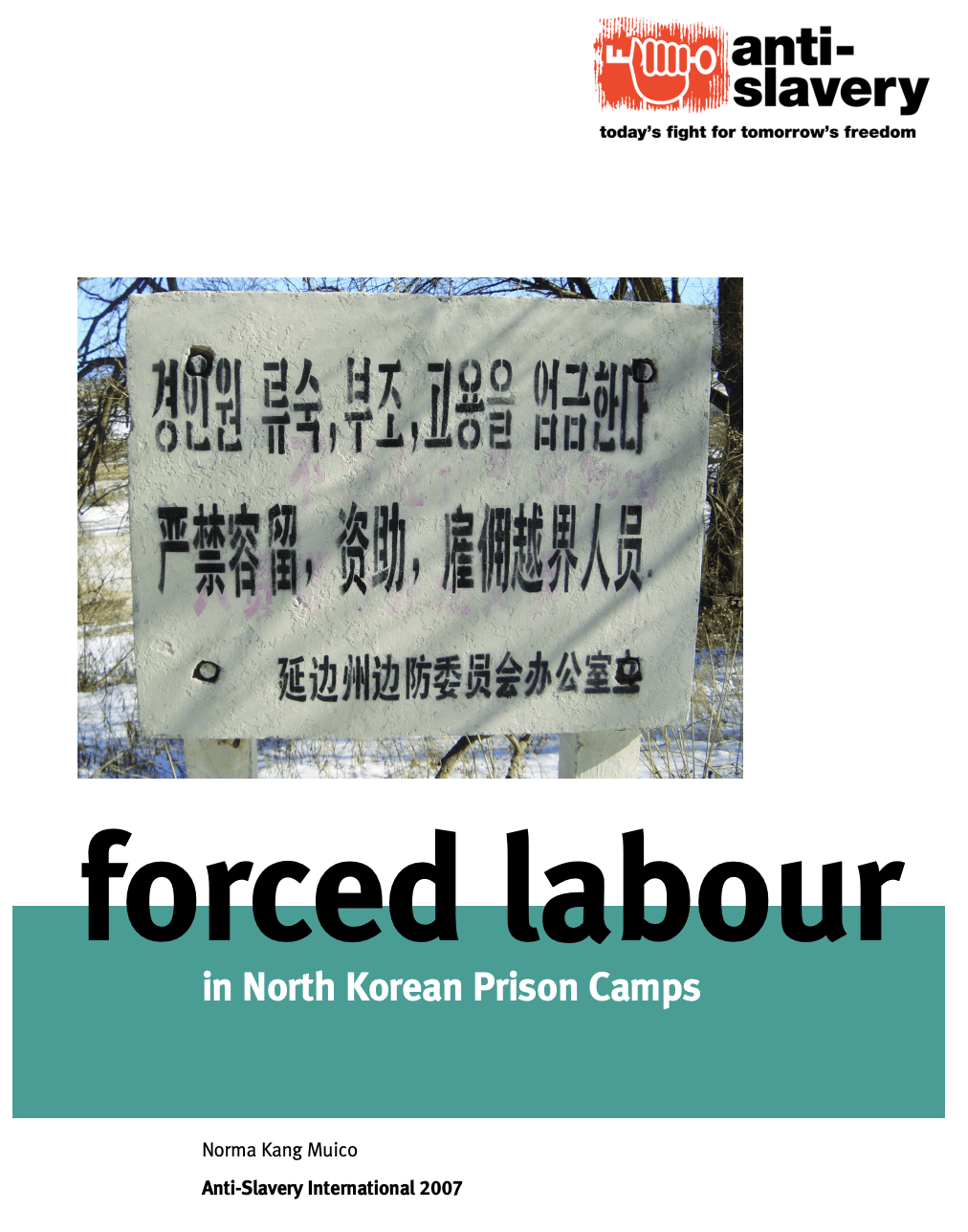
Forced Labour in North Korean Prison Camps
Executive summary
The flow of undocumented North Korean migrants into China started in the mid-1990s and continues today. The great majority of these migrants are not fleeing political oppression, but rather food shortages and economic crisis in North Korea. In the interviews carried out by Anti-Slavery International for this research 93 per cent of the North Koreans cite food shortages and economic hardship as the main factor for leaving North Korea.
In March 2007, the Government requested assistance from the World Food Programme (WFP) to address the issue of food shortages. The WFP estimated at this time that between one-third and one-half of North Koreans face a daily struggle to find enough food to eat. While food insecurity remains a critical issue, the crossborder migration of undocumented North Koreans into China will also continue.
This is an issue of concern to Anti-Slavery International because those North Koreans who are caught while crossing the border or who are deported by the Chinese authorities are subject to forced labour in North Korean prison camps. In the course of this research, Anti-Slavery International interviewed 30 North Koreans, all of whom were caught border crossing and imprisoned in North Korea. The majority of the interviews were with women from the Northeastern province of North Hamgyeong and most were incarcerated after 2003. The interviews took place in Jilin Province, China in the cities of Yanji, Wangqing and Antu (January 2007), and Seoul, South Korea (February 2005-2007).
The overwhelming majority had to perform forced labour while in detention before they were tried for the crime of border crossing. Most of the border crossers interviewed for this report worked 10-12 hours a day with no rest days. Forced labour usually takes place on State-run projects and includes farming, mountain logging, road works, stone quarrying, brick making, coal mining and construction.
Prisoners were beaten for various reasons (e.g. lying or being suspected of lying, not working fast enough, forgetting the words to patriotic songs, etc.). More than 90 per cent of the interviewees either witnessed beatings or were hit themselves while in detention.
Interviewees were also subject to other forms of degrading treatment and punishment (e.g. forced exercise as a form of punishment, being forced to sit without moving for prolonged periods of time, being denied access to toilets, public criticism, etc.).
The overcrowded and unhygienic facilities, combined with inadequate food, water and medical care and the arduous nature of the forced labour that prisoners have to perform mean that deaths in the labour camps are not uncommon.
Given the fact that the vast majority of border crossers are simply trying to exercise their right to freedom of movement in order to sustain themselves and their families, Anti-Slavery International believes that the arrest and imposition of forced labour on border crossers is not acceptable under any circumstances.
An analysis of data provided by those interviewed shows that in 70 per cent of cases, those arrested received no judicial decision, formal or otherwise. These unconvicted detainees were compelled to perform forced labour for an average of about 50 days, in direct contravention of international conventions such as the International Covenant on Civil and Political Rights, the International Labour Organization (ILO) Convention No. 29 concerning Forced or Compulsory Labour (Forced Labour Convention), as well as North Korea’s own domestic standards.
In light of the above, Anti-Slavery International calls on the North Korean Government to amend their Criminal Code so that leaving the country without permission does not constitute a criminal offence, to take immediate action to prevent unconvicted detainees from performing forced labour and to abolish the use of forced labour in prison camps.
Anti-Slavery International strongly urges the North Korean Government to invite the UN Special Rapporteur on North Korea to monitor human rights conditions in the country and in particular to carry out a thorough review of conditions in prison camps.
Anti-Slavery International is also renewing its call on the Chinese Government to stop the forcible repatriation of undocumented North Koreans from China, to recognise these North Koreans as refugees sur place and to grant the UNHCR access to these people in China, so that it can assess their individual circumstances and seek a safe and permanent solution to their situation.
Read more here.
